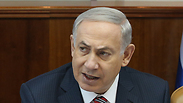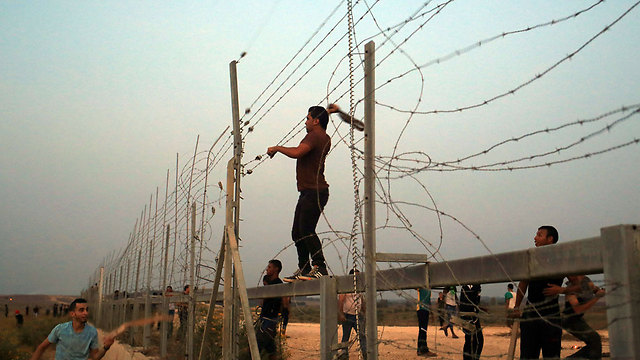
When Netanyahu says we will win, what does he mean?
צילום: עמית שאבי
Israel needs a new policy vis-a-vis Hamas
Op-ed: While Hamas is maneuvering and changing tactics and strategies, Israel is sticking to its traditional conduct between one operation and another.
The disengagement from Gaza was carried out in the summer of 2005. Two years later, Hamas took control while the Palestinian Authority was building a military power in Gaza with the help of the United States and the European Union countries to reinforce its rule in the Strip.
Two years later, Hamas' attacks on Israel increased, and we launched Operation Cast Lead in a bid to restore deterrence, while dealing the enemy a heavy blow. Three years later, a second operation, Pillar of Defense, was needed to achieve the same goal. It caused a lot of destruction, and one of its goals was allegedly to expand the intervals between the operations required to restore the deterrence.
Another operation, Protective Edge, was required only two years later, and the IDF fought Hamas for 51 days, causing the heaviest damage to the organization in the three operations. At the end of the battles, it was declared that deterrence "is back in its place."
In October 2015, about a year after Protective Edge, the Gaza area is warming up again. Ten years after the disengagement, dozens of Air Force sorties, countless of targets which have been hit and three wide-scale operations, the intervals between the rounds of fighting appear to be getting shorter. Hamas is surviving despite acting in a regional environment which is more threatening than ever.
Egyptian President Abdel Fattah al-Sisi is pressuring Gaza, often closing the crossings and flooding the tunnels through which weapons have been distributed with seawater. The Hamas headquarters in Damascus closed a long time ago. Hamas has never been weaker, more isolated and frequently required to fight against splinter groups - the Islamic Jihad and others - which are challenging its control on the ground.
Over the years, Hamas has learnt lessons, changed its fighting methods, demonstrated warfare abilities and pursued contact with our forces - and has now started checking a new strategy: A massive walk towards the fence in order to provoke the IDF, suffer losses and challenge the Israeli leadership with new dilemmas. The incitement of Palestinians in Judea and Samaria and some of Israel's Arab citizens gives Hamas advantages in the battle against us as well.
Nonetheless, Israel is indicating through its actions on the ground that it wants Hamas to continue ruling the Strip, both because every other alternative is perceived as worse and because - as Prime Minister Benjamin Netanyahu himself declared at the time - even if Operation Protective Edge had lasted 500 days rather than 51, we would have reached the same result but at a much higher price.
And so while Hamas is maneuvering and changing tactics and strategies, Israel is sticking to its traditional conduct between one operation and another: Uncovering terrorist cells, locating and killing terrorists who carried out attacks and conducting responsive Air Force flights aimed at preserving the deterrence, if only for short periods of time.
In the past decade, Hamas has been determining the intervals between the different stages of the conflict. The repeated chant - calm for calm - reflected the situation accurately and annoyingly. The government does not have to reveal its plans to us and to the enemy, but it does have to look us straight in the eyes and tell us what its goal is. When the prime minister says that we will win, what does he mean? What is the victory we should aim for? What is supposed to happen a day after the victory?
In light of the vitality of Hamas' ongoing control of Gaza in Israel's eyes, it is necessary to establish significant and routine, even hidden, contact with the organization on the governmental level. Let's learn from Russian President Vladimir Putin: While taking a risk by leading the battle to save the Assad regime in Syria, he invited Hamas leader Khaled Mashal to make an official visit to Moscow. Russia's strategic interest often contains contradictions. And what about us?
If the government doesn’t want or can't come up with a new, winning strategy in the battlefield, it must try the diplomatic channel. Ten years of more of the same prove that the old way has failed.
Efraim Halevy is a former Mossad chief.











